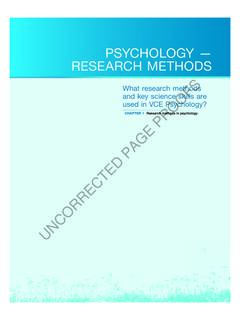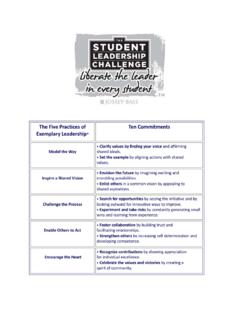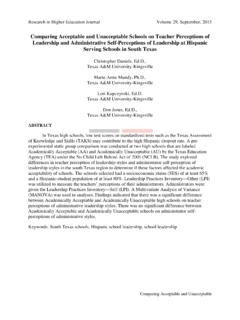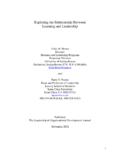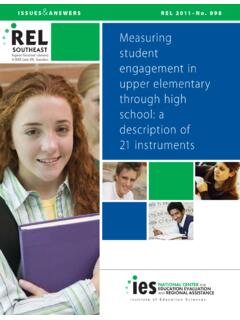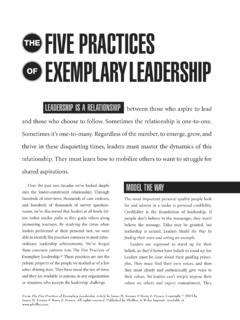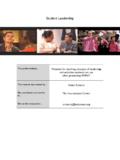Transcription of intElligEncE lEarning - wiley.com
1 EmotionalintElligEncElEarningWhat the research teaches Us about its importance to StudentsKorrel Kanoy, Emeritus, William Peace UniversityManaging Partner, Developmental Associates300 SomE BacKgroUnD on Emotional intElligEncEMany students who are intellectually capable of succeeding in college have difficulties with a variety of non-cognitive competencies such as time and stress management, establishing positive relationships, and making wise decisions. They may adopt dysfunctional coping styles that can cripple their academic efforts. Each of these problems can be described as a lack of emotional intElligEncE . With the current national graduation rate hovering around 55%, promoting emotional intElligEncE development in students should help raise retention and graduation rates, benefitting both students and institutions.
2 Emotional intElligEncE involves understanding and managing emotions effectively to achieve better individual and relationship outcomes. Emotions begin in the limbic area of the brain, which operates on a more primary level to fight, flee, or freeze responses that are not often helpful for students everyday challenges. Effective management of emotions requires that emotions be processed through the frontal lobe, the higher or executive function area of the brain. students frontal lobes are not fully developed until about the age of 25, leaving them vulnerable to actions and decisions that may be counterproductive. Given that humans experience over 300 emotions per day, it s critical to practice more effective responses than fleeing (ignoring, withdrawing), fighting (verbal, emotional, sexual, or physical aggression; passive-aggressive behavior), or freezing (staying stuck, giving up, not cooperating).
3 The more practice students get developing their emotional intElligEncE , the more they will build neuronal pathways to ensure that effective behaviors become more natural. For instance, the student who is frustrated by an assignment and typically gives up would learn different coping strategies that result in better outcomes. So would the angry student, the stressed out student, the unmotivated student, the disconnected student, and the student who cannot control impulses to party instead of study, among many others! 225 students frontal lobes are not fully developed until about the age of experience over 300 emotions per research reviewed in this white paper provides compelling evidence that better developed emotional intElligEncE is predictive of student success and that emotional intElligEncE skills can be learned by students through workshops, courses, and intervention programs.
4 It s time for colleges to begin teaching emotional intElligEncE skills; everyone including the institution that retains additional students to graduation benefits! What iS Emotional intElligEncE ?Emotional intElligEncE involves a set of skills that can be learned and developed. The most widely researched and validated models of emotional intElligEncE (EI) incorporate non-cognitive skills such as recognizing and effectively managing one s emotions; leveraging emotions to solve real-world problems; communicating effectively in emotionally-charged situations; making good decisions; building effective relationships; and managing intElligEncE anD StUDEnt oUtcomES: thE rESEarch caSEFrom achieving higher GPAs to engaging in less alcohol abuse, better-developed emotional intElligEncE (EI) gives students a significant advantage in college.
5 According to Song and colleagues (2010) both general mental abilities and emotional intElligEncE contribute in unique ways to predicting academic performance. Emotional intElligEncE , but not general mental abili-ties, also predicted the quality of students social interaction. First-Year college students : Emotional intElligEncE and gPa Numerous researchers have verified the relationship between higher emotional intElligEncE and academic success as measured by GPA. For example, Mann and Kanoy (2010), in a study involving multiple institutions and over 1500 students found that first-year college GPA was predicted by the following EI scales: Optimism Independence (negative predictor) Self-regard Impulse control Problem solving Parker, Duffy, Wood, Bond, & Hogan (2005) studied 1426 first-year students who attended four Ameri-can universities.
6 students completed the Emotional Quotient inventory : Short (EQ-i:S), an assessment which captures emotional and social intElligEncE , and were divided into two groups based on GPA: 1) successful, GPA of or higher after the first semester and 2) unsuccessful, GPA of below after the first semester. Comparisons between these groups revealed differences on 3 of the 4 EQ areas assessed including Interpersonal, Adaptability, and Stress Management. Gender differences were also found, with women scoring higher than men, a finding replicated by others at the college level (see, for example, Leedy and Smith, 2012).Others examining data from their campuses confirmed the studies cited above and found that first year students with higher EI scores performed better academically (see, for example, Evenson, 2008; Song, Huang, Peng, Law, Wong, & Chen, 2010) and that the relationship between EI and better academic perfor-mance is applicable to student cohorts as wide-ranging as honors students to athletes (Jaeger, 2004).
7 Perhaps most surprising is that even among students at a highly selective institution, optimism (an EI characteristic) was a better predictor of the first-year GPA than SAT score. (Schulman, 1995) 3 Perhaps most surprising is that even among students at a highly selective institution, optimism (an EI characteristic) was a better predictor of first-year GPA than SAT score.(Schulman, 1995)Emotional intElligEncE , gPa, and Upper classmenThe academic advantages of better emotional intElligEncE don t just apply to first-year students . In a longitudinal study, Sparkman and colleagues (2012) found that seniors who graduated four years after matriculation found that the EI skills of self-actualization, social responsibility, and happiness were positive predictors of cumulative GPA and independence and interpersonal relationships were negative predictors of cumulative GPA.
8 It s possible that students who are too independent don t ask for help when needed, thereby hurting their chances to make better grades. And, students who are so engaged in connecting with others may ignore their academic work, also hurting their chances for a higher GPA. Emotional intElligEncE , retention, and graduationSparkman (2012) also investigated graduation four years after enrollment and found that the emotional intElligEncE characteristics of social responsibility, impulse control, and empathy were the strongest positive predictors of graduation and that flexibility was a negative predictor of graduation. While high flexibility probably benefits students in adapting to the many changes college presents, it may not be advantageous to be too flexible when it comes to declaring a major; the student who continually switches majors may accumulate too much debt or take longer than four years to (2011) found students who graduated four years after enrollment were higher than non-graduates on seven EI skill areas as first-year students including self-regard; self-actualization; independence; social responsibility; reality testing; impulse control; and happiness.
9 A telling fact related to the importance of EI in predicting college success is that there were no differences related to entering academic ability as measured by SAT and high school studies examine retention and graduation control for academic ability as measured by high school GPA or SAT scores. For example, Keefer, Parker, and Wood (2012) found that, even after controlling for high school grades and gender, the failure to graduate six years after enroll-ment with an initial sample size of 1015 students was predicted by lower emotional intElligEncE in the interpersonal and stress management ( , stress tolerance, optimism) domains. Parker and his colleagues (Parker, Hogan, Eastabrook, Oke, & Wood, 2005), using matched samples, found that students who were retained to year two of college had better developed emotional intElligEncE skills than those who were not a certain level of academic skill is necessary to gain entrance to college, emotional intElligEncE skills appear to be more predictive of who completes intElligEncE can BE lEarnED: tEaching Emotional intElligEncE to StUDEntSResearch verifies that emotional intElligEncE can be taught to students and that increased emotional intElligEncE predicts better outcomes.
10 For example, Qualter and colleagues (2009) found that students who showed an increase in EI as a result of an intervention program were more likely to persist with their studies than those not participating. Schutte and Malouf (2002) taught emotional intElligEncE skills to students in a college transition course and compared them to students who complete a college transition course not focused on EI. Results were reported in terms of improvement in EI skills and retention: 1. The students in the EI-focused sessions, although slightly lower in overall EI compared to the comparison group at the beginning of the semester ( to ), exceeded their counterparts EI by the end of the semester ( to ), evidencing over a 7 point gain compared with about a.








